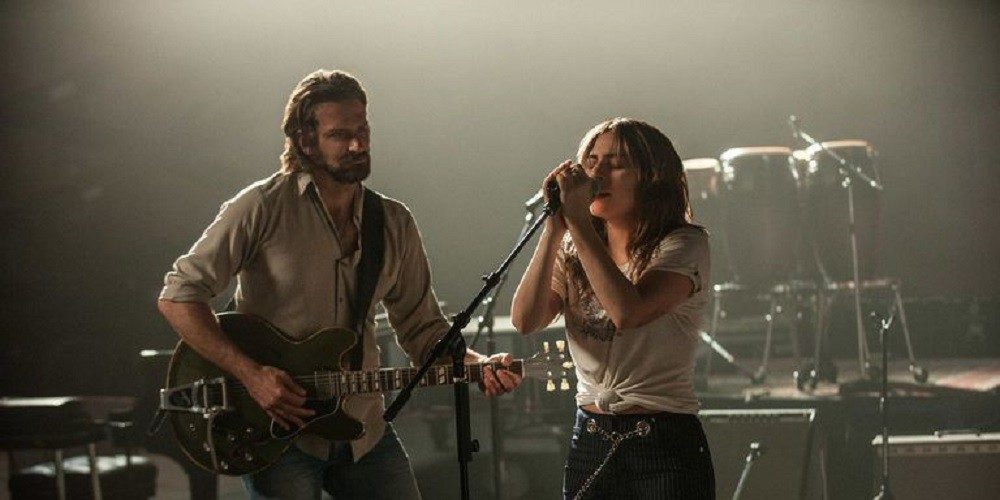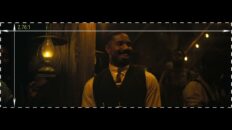First, a little history: The story of A Star is Born is 81 years old this year. The first iteration, starring Janet Gaynor and Frederic March, was not a musical, but features a plot little changed in its most recent descendent. The story has been attributed to several Hollywood romances of the 1930s, though there is no definitive proof it’s based on any particular couple. The original was considered a great critical and financial success, and was nominated for seven Oscars at the 10th Academy Awards, ultimately winning one for best original story. The first remake came 17 years later, starring Judy Garland and James Mason as the main couple. Re-imagined as a musical, it follows largely the same plot, only with a soundtrack that has not gone out of print since it first debuted in 1954. Despite being one of the most expensive films ever made at the time, it was also considered a commercial and critical success, and represented a thrilling comeback story for Garland, who was in something of a rut when the film was made. The most recent remake, a 1976 update starring Barbara Streisand and Kris Kristofferson, is generally considered the worst of the bunch. Though a commercial success and a number one album release for the soundtrack, history regards the film poorly. Talk of yet another remake started in 2011, as remakes are an even bigger thing now than they were then, and Warner Brothers already owned the rights to the film and story.
This is Bradley Cooper’s directorial debut, but you wouldn’t know it from how polished the film is. In addition to the work that comes from directing (and co-writing), Cooper also spent months with a vocal coach to add a full octave to his range, and spent almost a year with guitarist Lukas Nelson to be able to play all his own music during the film. There’s nothing particularly new about artists spending a significant amount of time training for a challenging role, indeed, it’s almost become mandatory for a role like this, but the amount of prep time Cooper put in to sing, play, direct, write, act, and record is staggering. For that matter, he’s really quite good. I’m not totally sure he could headline a tour, but his performances in the film are more than merely serviceable; he’s a lot of fun to watch, and I look forward to his tracks on the soundtrack. If you’re wondering about his normal speaking voice in the film being much more gravelly than usual, it’s because he worked with a vocal coach (in addition to singing) on making his voice sound more like co-star Sam Elliott’s rich, warm-buttery-cheese-grater purr. Elliott plays his older brother and has several key, emotional scenes with Cooper’s character, Jackson Maine.
Lady Gaga, now returned to her given name, Stefani Germanotta, was never in doubt for the singing parts of the film. Indeed, she absolutely crushes them, putting her vocal and style ranges on full display as she jumps from pop to rock to ballads and more. Her film debut is lovely. I’m sure there are actors out there who could have wrung more emotional resonance out of the role, but there are no obvious faults in her acting. Her first musical performance of the film, a duet with Cooper that’s already available ahead of the film’s release, called “Shallow” feels like something out of the singer-songwriter pop-folk duets of the 1970s. It is authentic, spellbinding, and a joy to watch. Their chemistry in these early concert scenes is electric, and the first half of the film is a fun ride because of it.
The plot isn’t a secret, given it follows a film plot that’s already been done three times, but if you’re afraid of spoilers, be warned from here on out. Maine is a desperate, self-destructive alcoholic whose life was poisoned at a young age by an equally destructive father. His chance meeting with Lady Gaga’s character, Ally, is perhaps the only bright spot in an otherwise dreary existence that belies his fame. The whole film is a downward spiral that begins at its brightest point, Jackson and Ally’s early days together at the start of her career, and ends with his emotionally devastating death and her being left to pick up the pieces. The film is a touch disjointed from time to time. It’s difficult to tell exactly how much time has past between various events, but that’s largely irrelevant. Cooper does an excellent job writing Ally and Jackson into individual characters with real motivations and feelings. Previous iterations have been faulted in their treatment of Maine, but here he is a tragic figure whose love for Ally is both his reason for being, his greatest success, and also the spark that leads to his death. Ally stands on her own, not as a similarly tragic wife to a destructive rock star, but as a conflicted character who desperately loves Maine, yet refuses to let him destroy her. She tolerates his drinking through much of the movie, but also puts her foot down at several out of control waypoints as she tries to force him onto a better path.

I think they carefully threaded their way through the trope of the doting wife who sacrifices herself to take care of her husband by making it clear she pushed him to take responsibility for himself, but also making it clear that it’s her choice to sacrifice some of her career to devote herself to him–not out of obligation, but genuine love. Their scenes together as the film comes to a close, especially as it becomes clear Jackson’s destruction is at hand, are harrowing. One would be hard pressed to find a dry eye in the theater as Ally sings the final song of the movie, a ballad written by Maine for her professing his undying love, introducing herself as Ally Maine and fighting to pull herself together and move on. It maybe sounds a little trite in this description, but Gaga pulls her emotional weight in the final scene.
There’s a bit of a meta-narrative happening in the film as well that’s difficult to ignore. Comparing Germanotta to Ally, both young singer-songwriters with powerhouse voices, both starting off with a style often less criticized and considered more authentic, both making a hard turn toward pop as they gained fame. There aren’t many of them, but YouTube has a handful of videos of Germanotta from her college days playing the piano and singing in performances that easily equal anything done by Alicia Keys. Her character, Ally, starts off with similar sitting-at-the-piano type songs and power ballad duets, and both share a history of singing in burlesque shows. So it’s easy to compare the two and call Ally’s shift biographical for Germanotta, but it’s not as clear to me. Maine clearly believes that Ally has lost herself artistically, having sold out and subsumed her own style for the one mandated by her sleazy manager. Ally is clearly proud of her work, but it’s less clear what she actually wants out of her career, whether this is the music she wants to sing, and whether it’s the story she wants to tell. It’s easy to see Maine’s criticisms as having a lot of truth to them. Germanotta, on the other hand, purposefully chose her electropop fusion style. Her iconic fashion choices, strange performance art pieces, and steady stream of dance pop ear worms were all expressions of her personal desire to push the envelope and expand pop in the same vein as Madonna’s press to redefine pop a generation earlier. I question, then, the easy assumption that there’s clear connective tissue between the two. Ally’s motivations are too vague, and Germanotta’s all too clear, to draw a conclusion.
Like any movie that heavily features music, the soundtrack makes or breaks the film. Of course, the music here is stellar, and the soundtrack is likely to be a best-seller. Lady Gaga and Cooper both insisted all the music be performed live, which was tricky considering much of it was performed in front of huge festival audiences where the music couldn’t be projected for fear of YouTube videos galore. It took a reported seven months of careful mixing to get the sound right, using several cutting edge techniques and dozens of carefully placed microphones around the various venues to get an accurate sound with no spoilers. I would be shocked if this didn’t find its way to Broadway at some point. It’s wonderful to see movie musicals of all types making their way back onto the big screen more often. Last year’s Greatest Showman was a more traditional musical where characters break into song and dance at random. But A Star is Born is a gritty rock musical that mixes laughter with tears. It’s clearly not afraid of its previous iterations, which it borrows from liberally, but departs where necessary. The core of the film comes down to Lady Gaga and Bradley Cooper. Get this combination wrong and the whole thing falls apart. Thankfully, they got it right, and this film is poised for great success.
A Star is Born is in theaters now.








